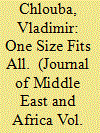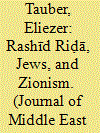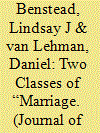|
|
|
Sort Order |
|
|
|
Items / Page
|
|
|
|
|
|
|
| Srl | Item |
| 1 |
ID:
182867


|
|
|
|
|
| Summary/Abstract |
This article examines the changes in the observation of mawlid, or the birth of the Prophet Muḥammad, that have occurred in the public sphere in Turkey during the past three decades. The innovations in the mawlid tradition have contributed to ending the containment of the cultural signifiers of Islam within the private realm and have constituted a step toward the construction of a contemporary, civic expression of religion. In this study the Blessed Birth Week is used as a case study of the exploration of innovation in religious praxis as contextualized in a festive culture. This work demonstrates that some of the core rites of the Blessed Birth Week have created opportunities for claiming of public space and civic institutions temporarily for Muḥammad and by semiotic extension for Islam as a whole. While some secular groups have criticized the Islamization of Turkish society through such invented traditions, some Islamists, too, have become uncomfortable with the secular appropriations that have taken place. The Blessed Birth Week has become a subject for negotiations not only between secularist and Islamist segments of the society, but also among Islamists, and this has led to the reconfiguration of the Blessed Birth Week as Mevlid-i Nebi Week. This article demonstrates both the interactive nature and the fragility of the process of change in religious praxis.
|
|
|
|
|
|
|
|
|
|
|
|
|
|
|
|
| 2 |
ID:
182864


|
|
|
|
|
| Summary/Abstract |
Nigeria has the largest Muslim population and economy in terms of gross domestic product in Sub-Saharan Africa. It is a member of the Organization of the Petroleum Exporting Countries and the Organization of Islamic Cooperation among other political, economic, or cultural groupings. Thus, especially in good economic times, Nigeria has a great deal of influence not only on the continent of Africa, but also beyond that geographical region as a middle power. Domestically, Muslims constitute a slight majority in Nigeria’s population with almost all the remainder being Christian. Although Nigeria’s constitution prohibits an official religion, twelve of the country’s thirty-six states (located in the north) follow sharia, or Islamic law. Before Britain’s colonization in the nineteenth century, the northern regions of Nigeria constituted parts of two Sunni Muslim political entities, the Sokoto Caliphate and the Bornu Empire. Although Nigeria’s military and civilian presidents have sometimes acted on their own whims with regard to foreign policy toward the Middle East, in most cases Nigeria’s economic development and internal security have been their overriding concerns. This article addresses Nigeria’s relations with Muslim countries in the Middle East, among them Turkey, Iran, and Saudi Arabia, which are also middle powers. Nigeria, through a balanced approach, has been able to avoid getting involved in Middle Eastern regional squabbles and disputes, while at the same time benefiting from economic investment from countries in that region. Nevertheless, corruption and inefficiency have precluded any real benefit for the vast majority of Nigeria’s population from the revenues derived from the export of hydrocarbons. All the while the country has been affected adversely by the actions of both Sunni and Shi‘i indigenous jihadist groups, which have been inspired at least in part by developments in the Middle East.
|
|
|
|
|
|
|
|
|
|
|
|
|
|
|
|
| 3 |
ID:
182868


|
|
|
|
|
| Summary/Abstract |
While much has been written about the resurgence of traditional authorities in sub-Saharan Africa, we know less about what explains differences in the institutional and regulatory frameworks that link traditional leaders to formal governments. Even though they have rarely been applied to resurging traditional leaders, existing theories of institutional choice are likely to yield important insights when applied to different models of mixed governance. In this article, the author closely examines the origins of the institutional framework that presently governs the relations between the central government and traditional authorities in Namibia. The author finds that both exogenous motivations such as the ideology of policymakers and endogenous determinants such as the potential for electoral mobilization matter for understanding the forms that mixed governance takes.
|
|
|
|
|
|
|
|
|
|
|
|
|
|
|
|
| 4 |
ID:
182866


|
|
|
|
|
| Summary/Abstract |
Muhammad Rashīd Riḍā was one of the most prominent religious scholars of Sunni Islam in the first third of the twentieth century, a reformer who sought to rehabilitate the Muslim world by means of a return to its origins, a strategy later followed by the Muslim Brotherhood and other fundamentalist movements. This article deals with a lesser-known aspect of Riḍā’s thought – his evolving attitude toward the Jewish settlement in Palestine and the Zionist movement. It began with appreciation if not admiration, continued in attempts at cooperation (in the face of common enemies and in general), and ended with anti-Semitic remarks and unequivocal religious rulings (fatwās) against the Zionist enterprise. All the same, even when Riḍā came to believe that the Zionist movement was an enemy that had to be fought, he still appreciated its abilities and continued to hold that Arabs and Muslims should take it as a role model both in fighting it and in general.
|
|
|
|
|
|
|
|
|
|
|
|
|
|
|
|
| 5 |
ID:
182865


|
|
|
|
|
| Summary/Abstract |
Some Somali majority clan girls and women receive economic and security benefits from marriage to Al-Shabaab fighters. Yet, the literature treats women’s experiences monolithically and misses the role that race plays in determining the circumstances of such unions. The authors argue that one should not refer to the unions of Somali Bantu girls and women with Al-Shabaab fighters as a “marriage” but rather as sexual and domestic slavery – a form of extraction by Al-Shabaab that works to ethnically cleanse the Bantu from their ancestral land. Drawing on data from an original survey conducted in 2017 of 139 Somali Bantu refugee households who fled to Kenya during the previous year, the authors examine the nature and extent of unions between females from different races with Al-Shabaab fighters. Women and girls from majority clans are more likely to marry fighters freely. Compared to majority clan females, Somali Bantu girls are enslaved by Al-Shabaab fighters at younger ages and typically remain with their own families rather than moving to the man’s household, contrary to Somali’s patrilineal marriage customs. Al-Shabaab fighters do not claim the children they have with Somali Bantu girls and women, whom they despise as a racially distinct minority with low social status. This work underscores the need to avoid the term “marriage” when referring to the sexual slavery of minorities in Somalia by Al-Shabaab and for the international community both to investigate claims of ethnic cleansing as well as support the fledgling Somali government in establishing a system of rule of law.
|
|
|
|
|
|
|
|
|
|
|
|
|
|
|
|
|
|
|
|
|